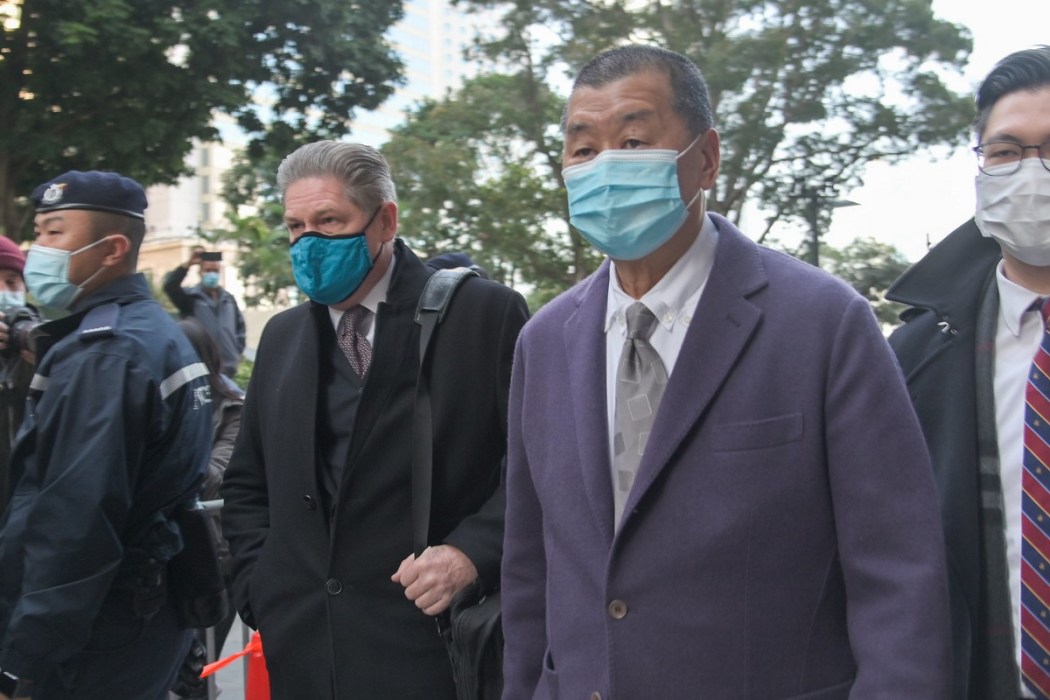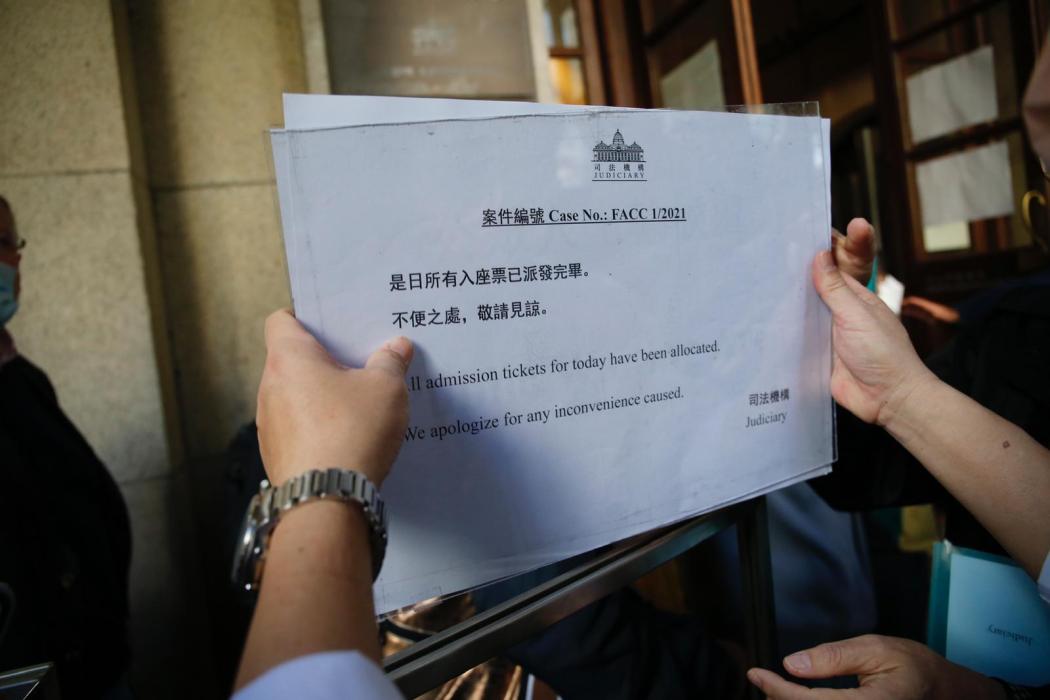Hong Kong pro-democracy media mogul Jimmy Lai was transferred to the Court of Final Appeal on Monday as the top court heard an appeal against the decision to release him on a HK$10 million cash bail pending trial over national security charges.
The Apple Daily founder’s bail was originally granted by the High Court Judge Alex Lee on December 23, 2020. The publishing tycoon is facing allegations of colluding with foreign forces and one count of fraud linked to an alleged land-lease breach. He was placed under house arrest with his travel documents seized, and was banned from posting on social media and giving media interviews.

But the 73-year-old pro-democracy figure was sent back to custody on New Year’s Eve after the top court granted leave to the public prosecutors to challenge Lai’s bail decision. Lai was previously denied bail twice by Chief Magistrate Victor So, before he applied for bail at the Court of First Instance.
Monday’s appeal was heard by a five-judge panel comprising of the new Chief Justice Andrew Cheung, permanent judges Roberto Ribeiro and Joseph Fok, and local non-permanent judges Patrick Chan and Frank Stock. None of 14 incumbent overseas non-permanent judges sat in the hearing.

The Chief Executive’s Office confirmed with HKFP earlier that Fok, Chan and Stock were all hand-picked by the city’s leader Carrie Lam to handle national security cases.
The hearing is set to determine the meaning of Article 42 of the national security law, which stipulates that no bail shall be granted to a criminal suspect or defendant unless the judge has sufficient grounds for believing he or she will not continue to commit acts endangering national security.

The appeal panel also had to review whether Judge Lee erred in his approach in extending bail.
Chief Justice Cheung announced at the beginning of the hearing that reporting restrictions imposed on bail hearings were lifted for Lai’s case.
‘Risk assessment’
Representative of the Department of Justice (DoJ) Anthony Chau argued that when handling bail application for cases linked to national security offences, the court should adopt a “two-stage approach” to give priority to Article 42, paragraph 2.
Other factors – such as bail terms offered by the defendant – should only be considered in the latter stage, Chau said, adding the judge must always bear in mind the nature of the offences endangering national security, which could be “difficult to detect.”
“The public cannot afford [an act] that endangers national security. The cost of failure is high,” the prosecutor said.

The appeal panel grilled Chau on why judges should not look at preventive bail conditions and other relevant factors when deciding on bail applications for national security cases. Ribeiro asked the prosecutor to explain how bail judges could reach a decision: “It is a risk assessment. Many things are relevant… it is rationally and logically important to consider bail conditions.”
In response, Chau repeatedly stated that Article 42 stipulated a “no bail unless” condition. He said no bail conditions could eliminate the risks of the suspect committing acts threatening national security again.
3/ Members of the public enter the Court of Final Appeal to watch Jimmy Lai’s hearing. Many of them had waited in line since early morning owing to the limited seating inside the city’s top court. pic.twitter.com/yQm9hRQnDK
— Hong Kong Free Press HKFP (@hkfp) February 1, 2021
But Chau’s remark was questioned by Stock, who warned that such comments may suggest a “no bail provision.”
Non-Permanent Judge Chan asked Chau to give examples of “acts endangering national security” which are not criminalised. The DoJ representative quoted some behaviour covered in Basic Law Article 23, which has yet to be enacted.

The panel said it would be “odd” for judges to be concerned with acts that are not yet criminalised.
In arguing why Lee was wrong in his approach to the extension of bail, the prosecution cited Lee as considering the defendant’s risk of absconding before Article 42 of the security legislation, which he said should be the “starting point” for reviewing a bail application linked to national security cases.
Motorcyclist case
Both the prosecution and Lai’s team made reference to a court’s refusal to grant bail to Tong Ying-kit, a motorcyclist who became the first person to be prosecuted under the controversial security law after displaying a flag featuring the banned slogan “Liberate Hong Kong, revolution of our times” whilst allegedly driving into police officers last July. Judge Lee, who extended bail to Lai, heard Tong’s bail review and his application for habeas corpus alongside Judge Anderson Chow.

Lai’s leading counsel Stewart Wong cited numerous overseas cases to argue that the court should consider the presumption of innocence and right to liberty when dealing with bail applications.
Wong rebutted Chau’s arguments on bail conditions, saying that – while national security offences are regarded as “high-risk” – Lee ruled in Tong’s case that it did not mean there was an “absolute no bail” condition. He said that, if the defendant is willing to offer stringent terms in exchange for release on bail, the prosecution “should be happier.”
“How can one say that possible bail conditions cannot be considered? How can a bail court deal with applications rationally?” Wong asked.
But Chau said most existing bail terms tackle the risk of absconding, rather than the possibility of committing acts endangering national security. He said that, if the conditions were tailor-made by the defendant, they could easily “get around” Article 42 of the security law.
But the appeal panel told Chau that whether the bail terms were acceptable would be up to the court’s assessment. It would not be an issue of Article 42’s construction as argued by Chau, the judges said.
Pro-Beijing protests
Outside court on Monday, pro-Beijing protesters gathered as people queued for hours to witness proceedings. A banner from the Politihk Social Strategic read: “Severely punish Jimmy Lai. Denounce the black hand of political black violence.”
The top court said it would hand down a judgement on another date, while Lai was remanded in custody.
Support HKFP | Policies & Ethics | Error/typo? | Contact Us | Newsletter | Transparency & Annual Report | Apps
Help safeguard press freedom & keep HKFP free for all readers by supporting our team
























